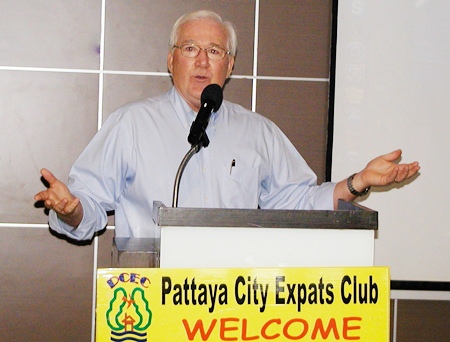Master of Ceremonies Richard Silverberg welcomed everyone to the regular Sunday meeting of the Pattaya City Expats Club on February 6, 2011 at Amari Resort’s Tavern by the Sea. After the usual opening announcements, he introduced Dr. Robert Brewitt, Superintendent of the International School Eastern Seaboard. Rob has a Doctor of Education degree from Washington State University, USA, and a lengthy background in providing education in international schools. Rob first came to Thailand in 1983 and except for two brief (2 year) absences, has worked in Thailand. Rob has been the Superintendent of the International School Eastern Seaboard since 2006.
Rob said he initially started in Thailand with the International School Bangkok (ISB), which was one of only five licensed international schools in Thailand. These schools were either nonprofit or government sponsored. ISB was sponsored by the American Government; Patana was sponsored by the British Government, and Ruamrudee sponsored by the Thai Foreign Ministry who contracted with Jesuits to operate the school. These three and a fourth sponsored by the Thai Japanese Association were located in Bangkok. The fifth school was in Chiang Mai and was sponsored by Christian missionaries. Also, at that time, Thai children were not allowed to attend international schools.
 Dr. Robert Brewitt, Superintendent of the International School Eastern Seaboard has a Doctor of Education degree from WSU, and a lengthy background in providing education in International Schools.
Dr. Robert Brewitt, Superintendent of the International School Eastern Seaboard has a Doctor of Education degree from WSU, and a lengthy background in providing education in International Schools.
He said that things began to change after the 1980 boom years resulted in an influx of many foreigners and their families. Soon, the existing international schools were at capacity. As a result, the government relaxed their restrictions and licensed more international schools as well as permitting Thai children to attend them.
Currently there are 122 international schools in Thailand with 21,000 students in Bangkok and another 9,900 in other parts of Thailand. There are about 4,000 non-Thai teachers employed by these schools. Also, there are two types of licenses for international schools; one is for schools that teach in English, but also have Thai language courses for their Thai students and the other is for schools that are bilingual with courses taught in Thai and English. Rob pointed out that if you are looking for an international school for your children, an important consideration is whether the curriculum is in English or is bilingual. Rob said that most of the international schools teach an American curriculum; but there are also schools that teach a British curriculum as well as some that have curriculums for Australia, Singapore, etc.
The demand for international schools outside of Bangkok came about when the Bureau of Investment (BOI) established incentives for businesses to develop outside of Bangkok. The BOI established 3 zones for businesses, the first being Bangkok which receive no incentives, the second being areas that border on Bangkok, including Chonburi Province, which receive some incentives, and the third being the rest of Thailand that receive all available incentives. Rob said that many may not be aware of why the driveway from Highway 331 to the Eastern Seaboard Industrial area is 7 km long. The reason is that the exit from Highway 331 is in Chonburi Province (Zone 2) and it is 7 km to the border with Rayong Province (Zone 3) where the industrial plants have located to get the BOI’s full incentives.
As a result of the buildup of industries in the Eastern Seaboard, the need for international schools increased. Thus schools such as the International School Eastern Seaboard (ISE), along with St. Andrews, Regents School, and others have begun operating. Most of these later international schools are private for profit schools.
Rob noted that one of the problems international schools have in Thailand is that one law governs all private schools. Consequently, academic schools are treated the same as a beauty school or a driving school with restrictions imposed, such as not being able to own the buildings where the school is located. Presently, the International Schools Association of Thailand is working with the Ministry of Education to change the law so international schools are treated differently from these other types of schools.
Rob concluded by mentioning several factors that a parent should consider in choosing an international school besides tuition, such as location, curriculum, extracurricular activities, and language.
After Rob answered many questions from the audience, Richard Silverberg updated everyone on upcoming events and called on Judith Edmonds to conduct the always informative and sometimes humorous Open Forum, where questions about living in Thailand and Pattaya in particular are asked and answered.




